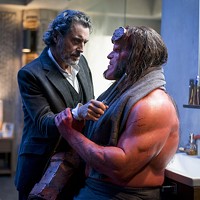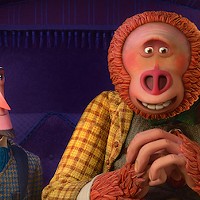

Back in 1994, when Keanu Reeves and Sandra Bullock costarred in the critical and commercial hit Speed, few would have imagined that time would reveal Reeves to be the better actor of the two.
Bullock's star-making performance in that fast and furious flick rushed through auditoriums like a welcome breeze on a muggy summer day: She was funny, spontaneous and charming, and those same traits helped turn the following year's While You Were Sleeping into a sleeper hit and cemented her standing as Julia Roberts' second-in-command among female box office draws. But with the exception of those imbecilic Miss Congeniality comedies, it's hard to recall a recent picture in which Bullock has been allowed to draw upon her natural charisma. She's not an interesting moper -- in fact, she's downright dull -- and it's been a chore to watch her slog through such pictures as (to name but two) Crash and Murder By Numbers. After about 20 minutes, you just wish somebody would tickle her.
On the other hand, Reeves in 1994 was just emerging from the first chapter in his career, the period in which his repeated miscasting in prestige pictures like Bram Stoker's Dracula and Much Ado About Nothing left critics and even fellow actors vigorously scratching their heads as to his ability to repeatedly land such high-profile roles. He was still a bit rigid in Speed, but he cut a dashing figure as a robust action lead, and he played off Bullock better than he had against any other costar up to that point (and beyond). Since then, he's excelled in a handful of diverse roles: iconic in The Matrix, funny in Thumbsucker and, in his best work, disarmingly romantic as he woos Diane Keaton in Something's Gotta Give. I'm not completely sold on his command of his craft -- the occasionally awkward line reading or stilted emotional outburst can still make me cringe -- but as a screen presence, it's hard to deny his scruffy appeal.
The Lake House, which brings the stars together for the first time since Speed, serves as an exclamation point to the evolution of their respective careers. They're in essence playing two sides of the same character -- lonely, damaged people who unexpectedly find love in a most peculiar manner -- yet because of how they approach their roles, it's far easier to get behind Reeves than Bullock.
Bullock plays Dr. Kate Forester, whose new position at a Chicago hospital convinces her to move into the city and leave behind the lake house she's been renting. Before departing, she whips off a welcome note for the next tenant, who turns out to be an architect named Alex Wyler (Reeves). But Kate's comments in the letter, concerning the condition of the house, don't jibe with what Alex sees, so he writes her back to clarify. As the missives keep flying back and forth, both parties come to the startling realization that they're actually corresponding over the years -- she's writing and receiving his letters in 2006, he's doing likewise in 2004 -- and that the lake house mailbox serves as the magic portal through which they're able to communicate.
Intrigued by this new form of long-distance correspondence, the pair remain pen pals, starting their relationship cautiously but eventually opening up to one another. Before they know it, they've fallen in love, which leads to the next step: How do they arrange to meet each other in the flesh? They try different tactics -- for example, Alex in 2004 makes a restaurant reservation for two in 2006, providing them with a set date to meet -- but fate always manages to keep them apart. Kate eventually decides that it's not going to work out and nabs a here-and-now boyfriend (Dylan Walsh), but we in the audience know it won't last because he would rather work late at night than join her on the couch to watch an airing of Alfred Hitchcock's Notorious (the fiend!). For his part, Alex never gives up trying to locate Kate, gradually realizing that their connection runs even deeper than they believed.
With its storyline of lovers separated by the years, The Lake House will inevitably be compared to 1980's Somewhere In Time, that audience-dividing love story with Christopher Reeve and Jane Seymour. But another movie entered my mind with more force: the lovely 1987 feature 84 Charing Cross Road, in which a writer in New York (Anne Bancroft) and a bookseller in Great Britain (Anthony Hopkins) pass the years by writing each other letters rhapsodizing about their mutual love of literature. That low-key gem needed no fantasy angle to sell its romantic spirit: It took its passion, its exaltation, from the very letters that were being exchanged. The Lake House certainly has its heart in the right place, and its central idea, which admittedly will sound daft to a great many people, could conceivably work under the right set of circumstances -- chief among them the presentation of two lovers whose ardor is so all-encompassing that we feel like we'll die if they don't end up in each other's arms before the closing credits.
But The Lake House doesn't even begin to inspire that level of swoony romance on our parts. The blame begins with director Alejandro Agresti, whose principal concern was apparently making sure that cinematographer Alar Kivilo captured the right lighting for each shot. Yes, it's all as pretty as a picture, only it's the wrong type of picture -- we expect a motion picture, but we get a still life instead. Scripter David Auburn can't be let off the hook, either. Auburn won the Pulitzer Prize for his play Proof about fiercely intelligent people (Gwyneth Paltrow and Anthony Hopkins starred in the film version last fall), but in this case, the writer should have been guided by his heart instead of his head. Because the two actors spend practically the entire movie apart -- rarely sharing scenes that would at least allow them to test-drive their compatibility these 12 years down the road -- it's up to Auburn and his text to provide some semblance of chemistry. Unfortunately, the entire film is arid and uninvolving, and Auburn is so busy adding twists to his outlandish scenario (most of which turn out to be predictable anyway) that he never spends enough time bringing his characters to life.
Whether it's due to my increasingly faulty memory or Auburn's increasingly faulty screenplay, I can't recall any reasons as to why Kate should be so sullen throughout the film. Alex has his reasons -- starting with a strained relationship with his difficult father (Christopher Plummer) -- and Reeves does a good job of making us empathize with his character's discontent. Bullock, on the other hand, simply grows tiresome, contributing to one of the most cheerless romances I've seen in a while. Granted, The Lake House tries to be different, but when the end result makes audience members feel as if they've just attended a funeral instead of a love story, something's definitely askew.
THE LAKE HOUSE
*1/2
DIRECTED BY Alejandro Agresti
STARS Keanu Reeves, Sandra Bullock




